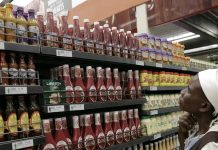Gazing into an empty space, with a silver chandelier dangling from a nicely decorated ceiling, and a nicely built house that can be mistook for a mansion, Melody Mapanda looked upset and emotionally drained.
She has been robbed of her only son by alcoholism and drugs, and cannot seem to stomach and understand where she went wrong in his upbringing, as she convinces herself that peer pressure and mob psychology is to blame for her son’s demise.

Narrating her ordeal to the Dailynews on Sunday, Mapanda said her son was very brilliant in his studies and much disciplined before he started indulging in drugs and slowly wasting away.
“Tonde was a very good boy, very focused in his studies and friendly. Things started changing when he came home end of first term during his lower six, he was a bit distant and would spend much of his time in his room and at first l thought he just needed space to concentrate more on his studies,” Mapanda said, trying to fight back tears.
“By third term the strange habit continued and when l tried to confront him he was so aggressive that he pushed me. While l was still trying to digest the situation, he dropped a bombshell on me that he will not go back to school as he is sick and tired of it.”
Mapanda said her efforts to try and speak sense into his son were fruitless as he was eventually suspended from school for bad behaviour and turned into an uncontrollable child, who even sell home property to acquire money to buy drugs.
Tonde is one among many youths who have thrown away their future for drugs and the addiction has made it impossible for him to stop. Despite getting everything he desires as he is from a rich family, he did not escape from the drug net that is swallowing the adolescents and youths in Zimbabwe.
While most cases of drug abuse has been attributed to poverty being a push factor, one cannot ignore the fact that even people from affluent backgrounds also succumb to alcoholism and drug abuse, making alcoholism and drug abuse a cause for concern in Zimbabwe.
A study conducted in 2002 entitled ‘Drug Use, Abuse and Alcoholism in Zimbabwe’ concluded that alcoholism is one of Zimbabwe’s four top diseases and predicted that in 2022, alcoholism will be the country’s number one social problem.
Most researches suggests that early 12-14 years, to late 15-17 years adolescence is a critical risk period for the initiation of substance use and may peak among young people aged 18-25 years.
The 2018 World Drug report showed that Cannabis is a common drug of choice for young people, adding that there are two extreme typologies of drug use among young people: club drugs in nightlife and recreational settings among affluent youth; and use of inhalants among street children to cope with their difficult circumstances.
“A huge number of youths and adolescents in Zimbabwe are initiated into drug abuse either at youth parties or via food items they term space cakes which they share as friends at school,” said one psychologist, Jackie Moyo.
According to a recent United Nations Office on Drugs and Crime (UNODC) report, the non-medical use of prescription drugs is becoming a major threat to public health and law enforcement worldwide.
UNODC Executive Director Yury Fedotov said the report show that drug markets are expanding, with cocaine and opium production hitting absolute record highs.
Zimbabwe Republic Police CID drugs and Narcotics detective Majaha Mkwananzi said while the law work on drug supply reduction on the streets, the health sector and the community will also have to work on the demand reduction through encouraging a morally apt society.
“Children learn from observing, when parents or older people around them abuse drugs, they tend to copy and aspire to be like that, thus the older generation should lead by example,” he said.
Mkhwananzi encouraged parents and guardians to be always on the lookout for strange traits that their children might start developing so that they address the situation before it gets worse.
“The sad part of it is that these youths and adolescents always find themselves at the wrong side of the law as they cause problems in the community when intoxicated,” Mkhwananzi said.
Medicines Control Authority of Zimbabwe (MCAZ) projects and public relations officer, Shingai Douglas Gwatidzo said the problem need to addressed at the point of entry, as these drugs are being sold in the country pointing out that there is a market for them, hence the need for awareness campaigns and educational programmes to encourage the populace to quit abusing drugs.
Speaking to the Dailynews on Sunday, Get High on Life founder, Paul Nobes , who recovered from alcoholism and drug abuse 17 years ago and decided to set up a sober house offering a safe and sober haven for addicts and alcoholics exiting rehabilitation, said there are many factors that can spur alcoholism and drug abuse outside poverty.
“Childhood trauma and history of addiction in the family are some of the unmentioned causes of drug abuse,” he said.
“These drug addicts need to be taken care of, educated about dangers of abusing drugs and monitored by health practionioners.”
According to the Zimbabwe Civil Liberties and Drug Network (ZCLDN), approximately 290,000 youths in the country are abusing drugs and alcohol.
Parirenyatwa psychiatric unit nurse in charge Tinashe Chimonyo, said three quarters of the youths in Harare are abusing drugs and the males are the prevalent sex in drug abuse and alcoholism.
“We encourage parents and guardians to never give up on their children when they are caught in the drug net, but rather seek help,” Chimonyo said.






